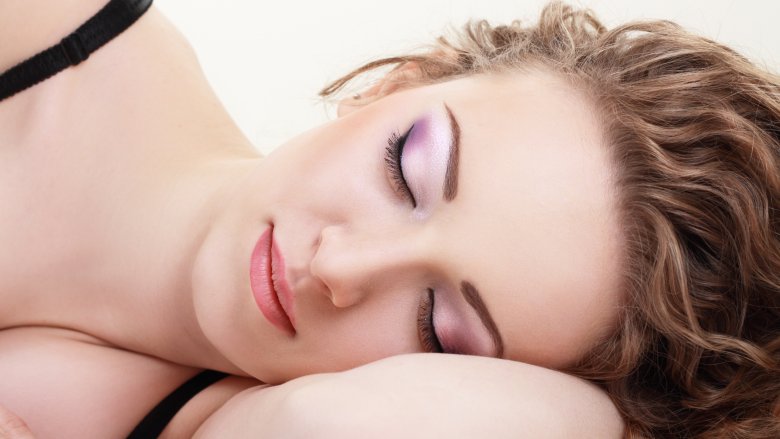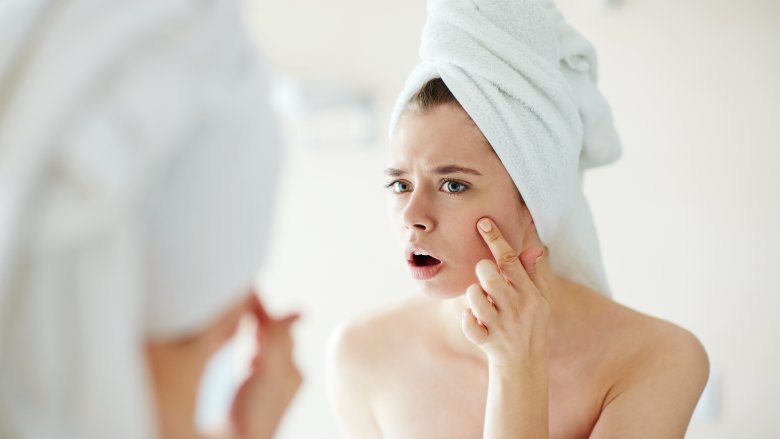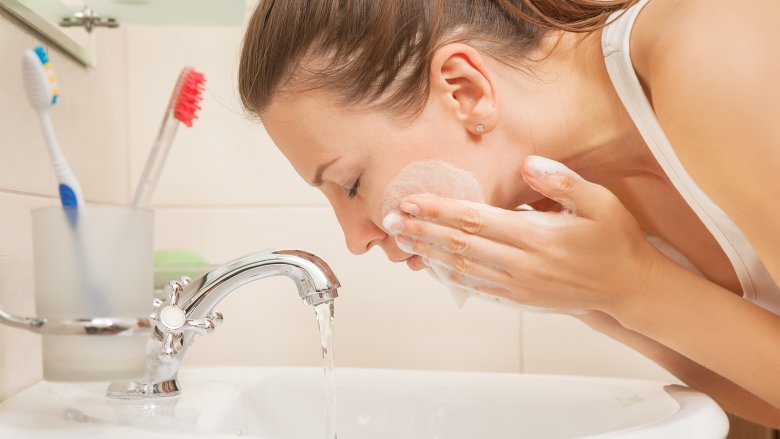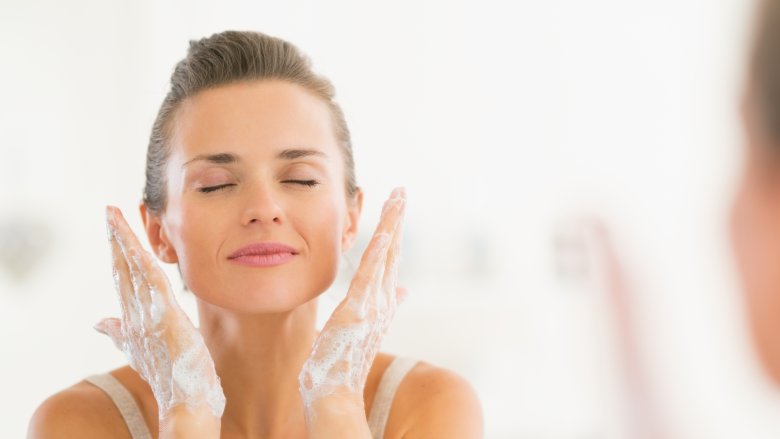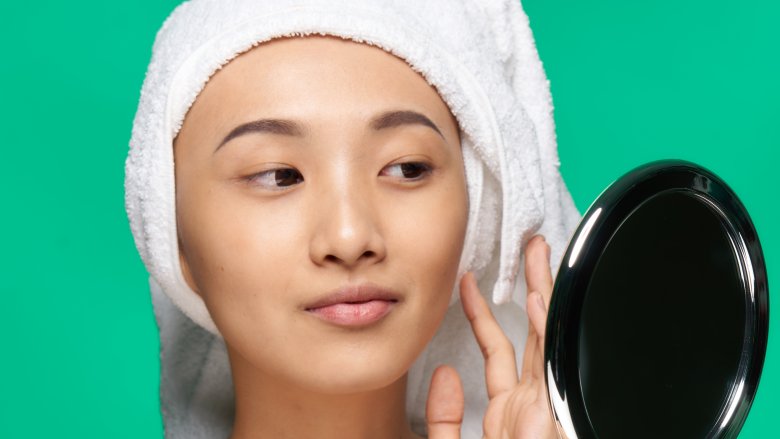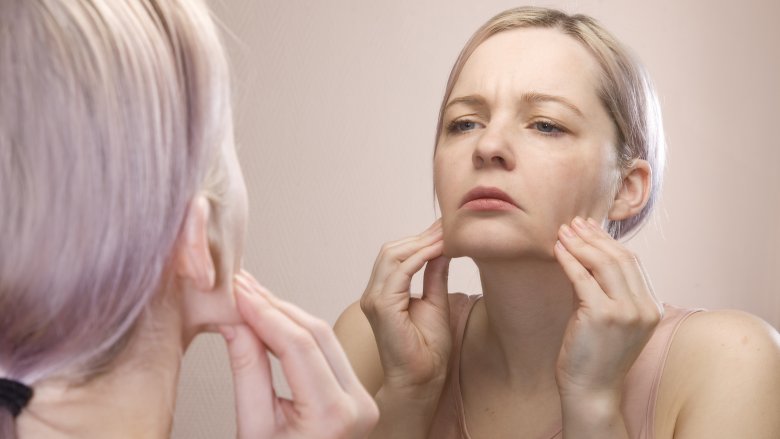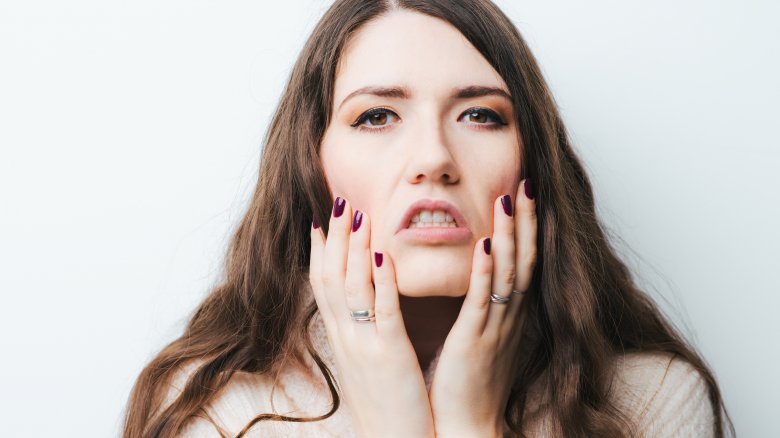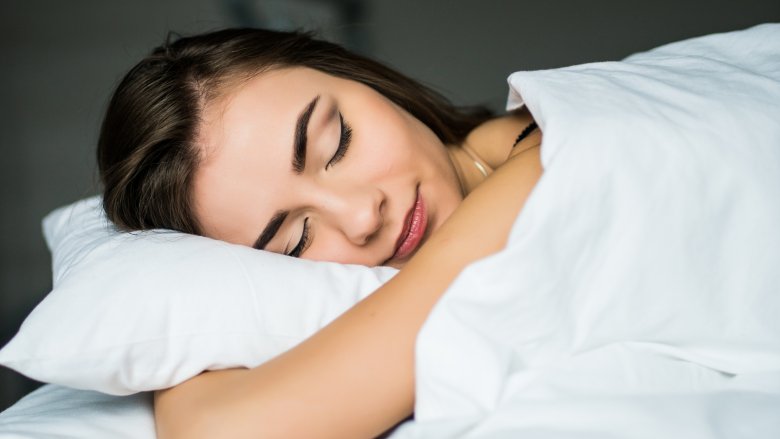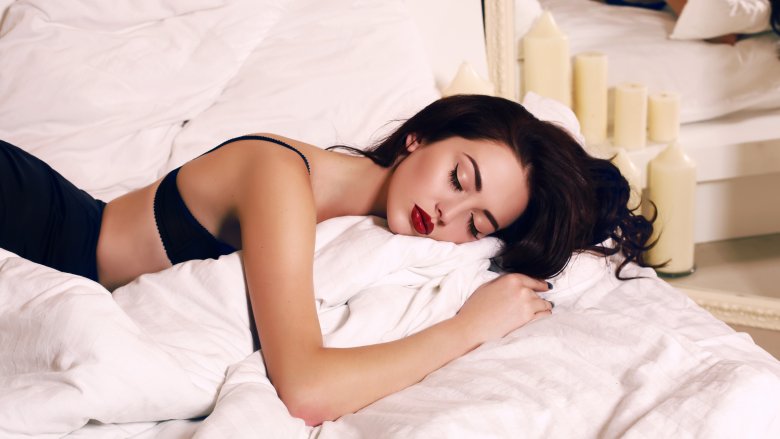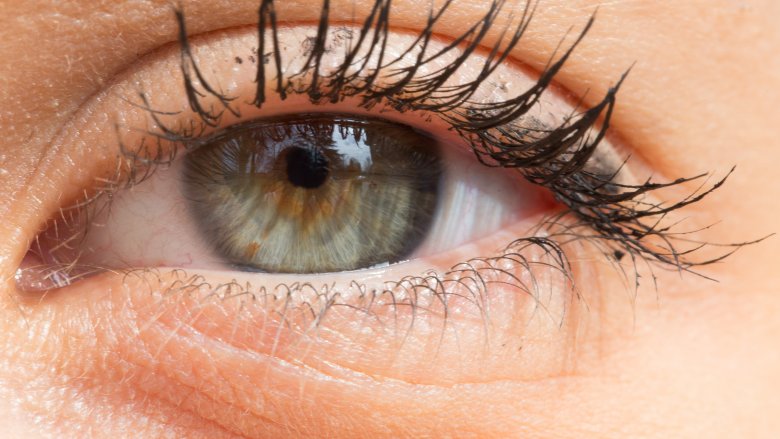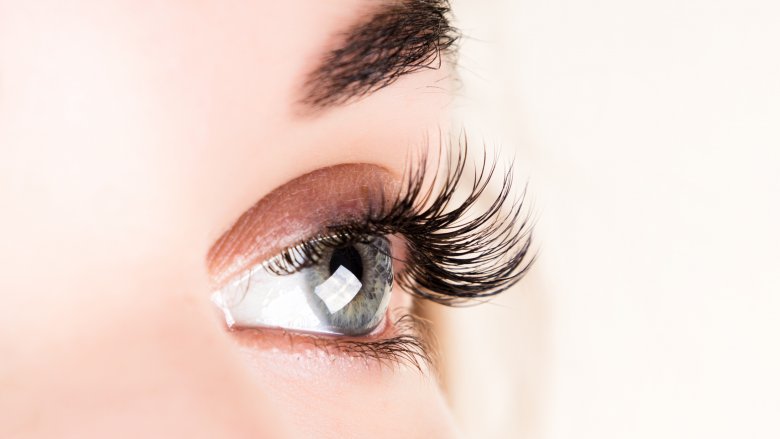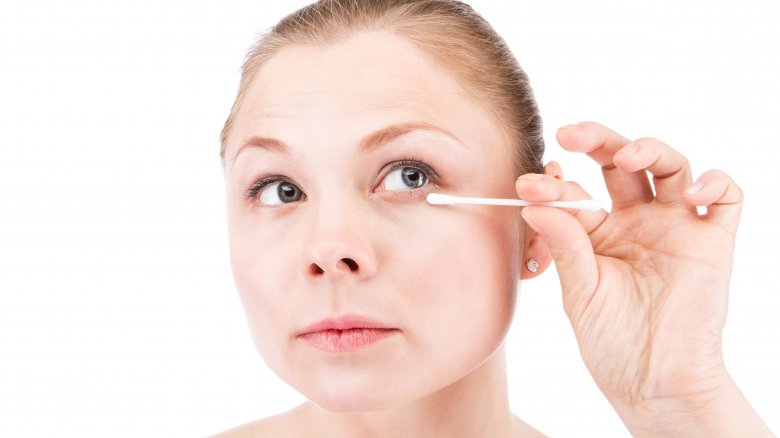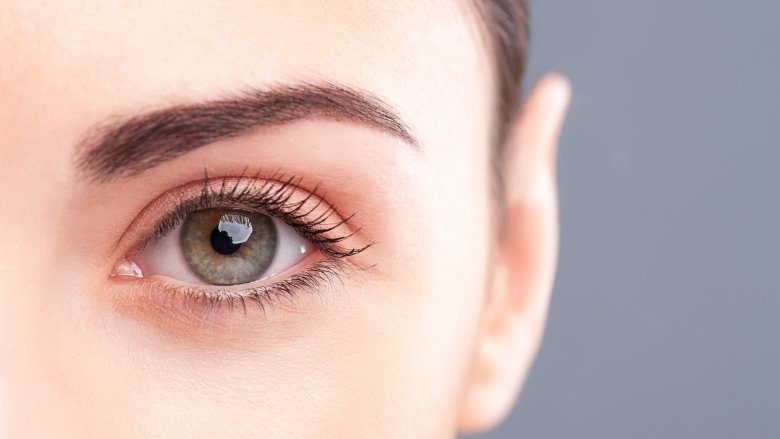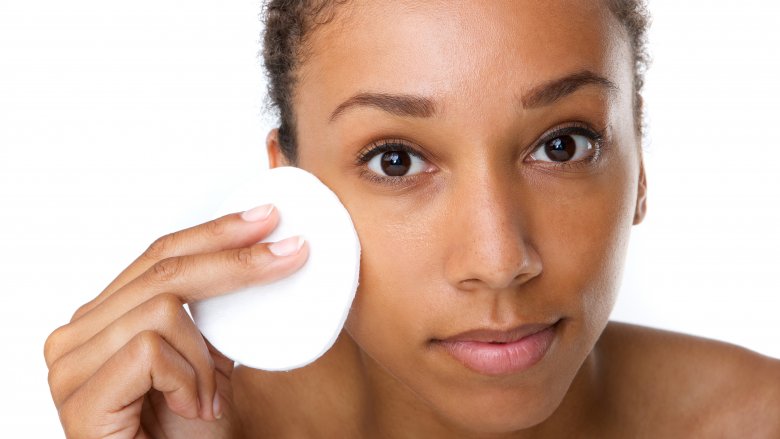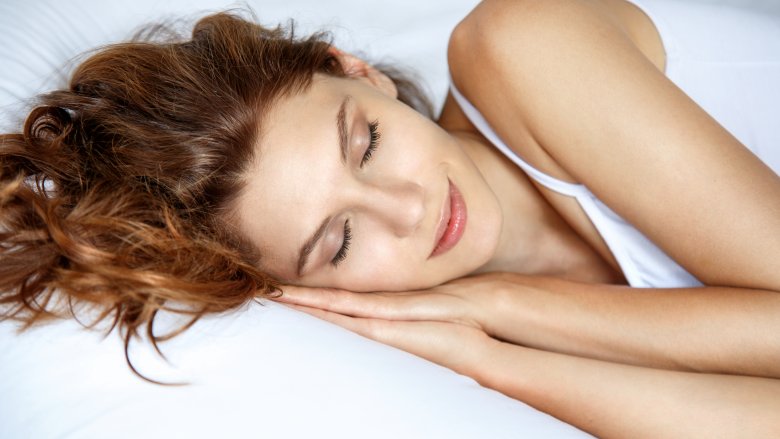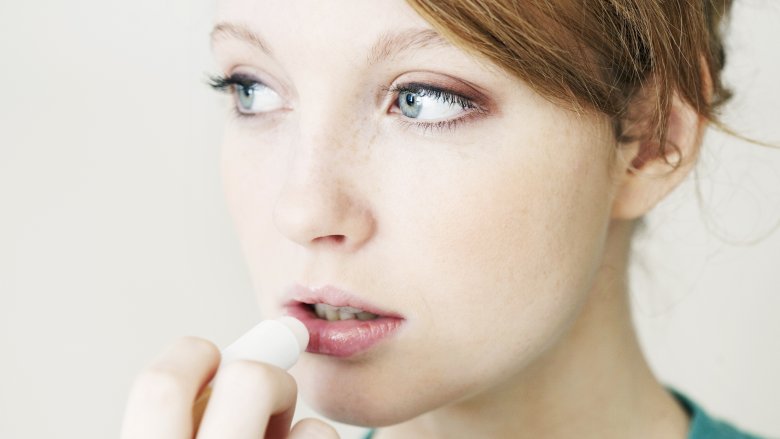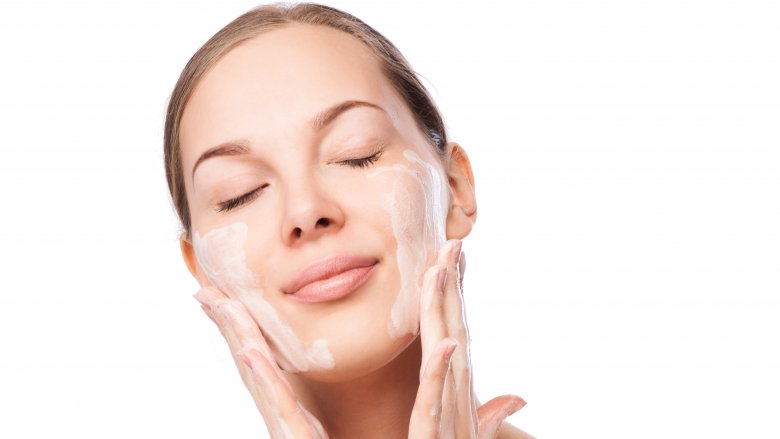What Really Happens When You Sleep In Makeup?
You don't need a degree in dermatology to realize that sleeping with your makeup on is a horrible idea. It's not good for your skin or your sheets. You might think, It's late. I'm tired. What's the harm of crashing out without washing my face just this once? Well, it causes more harm than you might think. Going to be bed without washing your face is bad news and can have a cumulative harmful effect. Here's the icky stuff that happens to your skin, your lashes, and beneath the surface when you nix removing your makeup before bedtime.
Pores get clogged
Sleeping with makeup on is murder on your pores. "Going to bed with makeup on will leave you with clogged pores, since so many makeup [products] have ingredients like silicones that block the pores," Debra Jalman, a New York City-based, board-certified dermatologist and author of Skin Rules: Trade Secrets From A Top New York Dermatologist, tells me. "When the pores are blocked, your skin gets bumpy. If you are acne-prone, it can even lead to breakouts." You are effectively damaging skin by neglecting to remove makeup at the end of the day.
You get acne
Beverly Hills dermatologist Dr. Harold Lancer points to the fact that our skin never stops working, just like our hearts never stop beating. He tells me, "Just like our internal organs, our skin is always at work. Skin is made up of water, protein, lipids, and different minerals and chemicals. Skin is also covered in pores, which allow us to sweat and secrete sebum, a natural lubricant that moisturizes skin and removes dead skin cells and other irritants from our pores. When you apply makeup, you block your pores from releasing sebum, which may lead to visibly larger pores and acne overtime."
Dr. J. Matthew Knight of FAAD Knight Dermatology Institute also notes that "the mechanical pressure of your face on a pillow can grind makeup into hair follicles, leading to clogged pores acne." Losing a few minutes of shut eye in favor making use of some cold cream and face wash doesn't seem like such a hassle when you think of it from that perspective, does it?
You damage skin cells
Skin cells are also damaged by the practice of sleeping in makeup. Dr. Knight sums it up best, saying, "Makeup can trap environmental pollutants and free-radicals that can damage skin cells, including collagen, leading to premature skin aging." So not only does crashing out with your concealer on ultimately clog pores and lead to zits, but it can also speed up the aging process. Ack.
Your skin becomes dull
Dewy, glowing, soft, and smooth skin is usually a desired trait. Dull, sallow, or parched skin is not. If you use a makeup product, like a highlighter, to impart some peachy pink glow, that's great. But sleeping in it can cause the opposite effect. "Our skin is the largest organ of our body and it performs vital functions for our body, like secreting sweat, excreting lipids, healing wounds and heat regulation," New York-licensed esthetician and makeup artist Liz Donat tells me.
"So it is imperative that we cleanse and exfoliate it regularly and we especially do not sleep in our makeup! Clogged pores and blackheads, aka comedones, are formed when dead skin cells, oil and makeup get trapped in the pores and suffocate the skin," she continued. "These clogged pores are the pre-cursor to acne-like breakouts and make the skin look dull and lifeless." That's reason enough to reach for a makeup remover wipe or a washcloth, no matter how late it is or no matter how tired you are.
You interfere with the reparatory process
Our bodies regenerate while we are at rest. The same holds true for our skin. Lancer says, "Skin repairs itself while we sleep, so taking off your makeup at night is important because it allows your pores to release sebum that rehydrates and protects your skin from free radicals in the air." If you leave makeup on, it disrupts these critical processes.
You set yourself back
As stated, when you sleep, skin regenerates and heals itself. One night of sleeping with makeup on can and will disrupt the delicate balance of your skin and set you back. Dermatologist Dr. Kathy Taghipour of Savana Urban Spa tells me, "When you sleep, your skin regenerates. When your pores are blocked, your skin can't breathe, and thus it can't regenerate. The oil in your pores build-up and transform itself into a bacteria, which can lead to various skin problems. After a night with your makeup on, your skin will need about a week to restore its previous condition and to balance again everything." A whole week? It's not worth it. Take that makeup off, people!
You can speed up the aging process, aka get wrinkles faster
Andrea Rodriguez of Chalet Cosmetics points to another bad byproduct of this habit — premature aging! "Sleeping in makeup clogs pores causing breakouts, dries out the skin causing redness and sensitivity, and speeds up the aging process leading to premature wrinkles," she tells me.
Murat Evin, Creative Director at The London School of Make-Up, also warns about sleeping in makeup leading to the onset of wrinkles. "Not removing makeup before you go to bed means that it cakes onto your face," he tells me. "As wonderful as makeup is, if it is not properly removed before bed, it can lead to a collagen breakdown. If collagen cannot be produced properly, it means your skin ages faster than it is supposed to; drying out, it creates more wrinkles and helps to deepen existing ones."
Your skin dries out
Leaving makeup on overnight, even if you wash your face in the morning, causes flakiness, unevenness, and dryness, according to Evin. He says, "If you properly cleanse your face at night, and moisturize with products that include ingredients like aloe or witch hazel, this gives your skin chance to repair and replenish itself at night." He continued, "Not removing your makeup will deny your skin this chance and instead cause it to dry out. As a result, every time you wrinkle your forehead or squint in your sleep, the impression will stay there for longer."
He furthers his previous point, saying, "Dry skin means a loss of elasticity... making wrinkles and impurities more prominent than ever. If your skin continues to be neglected like this frequently and for long periods of time, it can make wrinkles look more like scars, they become that deep."
You end up with an uneven skintone
Jennifer Yen, an actress and beauty expert who founded purlisse, tells me that in addition to the aging factor and lack of hygiene, "skipping out on proper skincare can also make an already uneven skin tone worse. This is because your skin regenerates at night as you sleep, so depriving it of ingredients known to combat pigmentation means that any recourse for skin damage has been removed. The same principal applies to age spots/dry spots too."
Your cell regeneration is interrupted
Sleep doesn't only rest our bodies and our bones — there is more at play. "Cell regeneration happens overnight when you sleep," Lauren Ing, the president of SMD Cosmetics, a natural skin care from South Korea, tells me. "So sleeping with makeup on interrupts this process and clogs pores! It literally prevents cell turnover, which you need for youthful skin, thus you look old, tired, dry and unhealthy. Skin is an organ and most makeup is full of toxic chemicals, so it's a MUST to wash your skin before you sleep."
Your eyes get irritated
Puffy and irritated eyes can be a result of sleeping in makeup, as well. Donat says, "Eye makeup, like shadows, kohl liners, and mascara, must be washed off every single night before bed. Otherwise, the eye area will respond by being puffy and red. Lashes protect our eyeballs from dust, pollen, and environmental pollutants. So when we don't wash them thoroughly, that debris, mixed with makeup, will trigger our immune response to kick in to fight off a possible infection. The result: swollen, red, irritated and tired eyes." Long, curled, and voluminous lashes pair best with smoky eyes or a cat-eye flick, not irritated, bloodshot, and puffy peepers!
Eyelashes can break off
Another negative result of sleeping in your eye makeup, like mascara and eyeliner, is that the product can rub into your lashes, causing breakage. That's why it's important to take it all off, per Lancer. Rodriguez of Chalet Cosmetics concurs, saying, "Failing to properly remove eye makeup causes lashes to break." Use a gentle remover. Your lashes will thank you.
You can get styes
"Sleeping with mascara on can not only cause your luscious lashes to become brittle and break off, but can also clog your lash follicles creating styes. Yikes," Sydney Ziverts, Health & Nutrition Investigator for ConsumerSafety.org, tells me.
Eyelid eczema
Eczema is a common skin issue for many, but on the eyelid? Yep! "Failing to properly remove eye makeup and leaving shadows,liners, and mascara on could result in causing an irritant dermatitis, essentially eczema of the eyelid areas," Dr. Robin Evans of Southern CT Dermatology tells me. "It could result in a rash, scaliness, itching, and sometimes a burning sensation in the area. Treatment with a dermatologist would be indicated if this occurs, usually using a low potency topical steroid."
You can scratch you corneas
Brendan O'Brien, Vision Direct's Chief Operations Officer and former optometrist, broke down the deeper damage that sleeping in makeup can cause. "Removing eye makeup, especially mascara, before you go to sleep is important both for general hygiene and your eye health," he tells me. "Mascara tubes are prone to the build-up of bacteria and the constant push and pull of the wand can make this worse. It's a good idea to change your mascara every three months to avoid bacteria from growing in the tube and ending up in your eyes."
But beyond that, O'Brien says, "Repeatedly sleeping in eye makeup may also lead inflammation in the eyes as it can block sensitive pores and glands such as the Meibomian Gland pores. When left on overnight, mascara can dry up and cause your lashes to break or fall off. This is problematic as eyelashes are essential for protecting our eyes from any dust and debris. A broken eyelash could also end up getting in your eye and scratching your cornea, so it really is important to remove your mascara before going to bed."
You make a mess of your sheets
Sarah Brown, a sleep wellness expert with Mattress Firm, realizes that it's somewhat common knowledge that going to bed with makeup on can cause wrinkles and dry skin. But there is a bigger problem. "When you wear your makeup to bed, you're actually spreading the problem. Not only are you causing dry skin and wrinkles, but you're leaving behind makeup residue on your bed. This is a nasty cycle because on nights when you do clean your skin, you'll be resting it on bacteria filled, makeup covered, pillows and sheets. Think of it like walking the streets of New York barefoot and then crawling into bed." Ick! Gross! If you needed another reason to never break your routine of washing your face and removing makeup before bed, you just go it.
You get chapped lips
Chapped lips are the worst. They are painful. Plus, cracked, flaky lips are not the surface you look for when applying gloss or lipstick. So if you fall asleep with lipstick on, they suck out the moisture and lead to chapping, according to Ziverts.
Don't break with routine
Routines and regimens are critical for your skin's health. Cynthia Bailey, MD, dermatologist and founder of DrBaileySkinCare.com, stresses the importance of keeping your routine and not slipping into the habit of sleeping in makeup. She also offered these tips for how to take the best care of your skin and how to remove your makeup.
"Your face should be washed twice daily to remove oil, dead cell buildup and product that's mixed in with the oil and cells," Bailey tells me. "When we look at facial skin biopsies under the microscope, you would be shocked at how much makeup and product gets stuck in pores and between dead skin flakes," she says. "This 'gook' makes your complexion look dull and pores look even more clogged that normal. Eye makeup will also irritate eyes and clog the many oil glands around the lash line with particulate matter from product, pigments and mineral particles."
She concludes, "Night time is the best time for retinoids — anti-wrinkle fighters that also help improve uneven skin pigment, fight clogged pores and acne too. Retinoids, like retinol, break down with light, so apply them before turning off the light for sleep."


